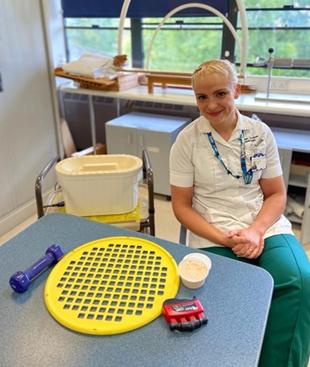
9 minute read
West Midlands - A Journey into Clinical Practice : A Focus on the AHP Support Worker
A journey into clinical practice: A focus on the AHP support worker
Author : Dr Nicky Eddison, Charlotte Tarbuck, and Dr Ros Leslie Trust : RWT
Our clinical workforce has a diversity of skills and experience. The journeys staff have taken into a clinical role are also diverse. This article explores the path taken by Charlotte Tarbuck, one of the Trust’s Assistant Practitioners, and discusses the role of the Allied Health Profession (AHP) support worker.

Charlotte Tarbuck’s experience
I started working in the NHS doing bank work on reception at a mental health hospital Trust. I progressed to a fixed-term contract post as a data input clerk at the Royal Wolverhampton NHS Trust, working as a band two in the therapy services department. My progression continued as I moved into a clerical officer role. In these roles, I learned many skills including organisation, communication, and IT skills. It was whilst I was in this role, I realised I would like to be more involved in patient care. I wanted a role which had a clinical element to it.
October 2022



I have a history of competitive kickboxing, with a keen interest in running and swimming so physiotherapy was naturally of interest to me. I spoke to my manager who suggested spending some time shadowing the clinical teams on the wards to see what the roles involved. Shadowing the team cemented my ambition to become a support worker. I knew it wasn't going to be a glamorous role, but I could see how much the physiotherapists and occupational therapists were helping people and the impact of their work. I decided to apply for a band three AHP support worker role, and I was delighted to be appointed, becoming a member of the rehabilitation team.

October 2022



I have a history of competitive kickboxing, with a keen interest in running and swimming so physiotherapy was naturally of interest to me. I spoke to my manager who suggested spending some time shadowing the clinical teams on the wards to see what the roles involved. Shadowing the team cemented my ambition to become a support worker. I knew it wasn't going to be a glamorous role, but I could see how much the physiotherapists and occupational therapists were helping people and the impact of their work. I decided to apply for a band three AHP support worker role, and I was delighted to be appointed, becoming a member of the rehabilitation team. Initially, it was frightening, and I felt overwhelmed by the amount of knowledge required. I felt out of my comfort zone and away from my previous skill set. I found the medical knowledge and abbreviations very difficult for the first few months and I felt the pressure of the increased expectations. Communicating with a large multi-disciplinary team (MDT), including consultants, was also daunting. I learned as I went along and eventually, I knew what I was doing and LOVED the job. I was able to make a difference in people’s lives and send them safely home from the hospital. I learned how to speak comfortably with the MDT to facilitate safe and effective care. Moving from an administration role, where I felt comfortable and knew what I was doing, to a scary acute medical ward where I felt out of my depth took courage, but it was the best thing I have ever done!

October 2022


Even the smallest of things I do or say can make such a huge impact on a patient’s well-being or quality of life. Listening to patients makes a huge difference. The skills I learned in my administration roles were all transferrable and helped me enormously. My progression to an AHP Assistant Practitioner has given me increased responsibility, to be able to work unsupervised in an outpatient setting. I now carry out home visits and have my own caseload of patients, all whilst being able to seek input from registered AHPs when needed. My confidence has grown, and I have developed clinical and life skills beyond what I had envisaged. I am now hoping to start an access to healthcare course at college as a route into university to become a registered AHP in the future.



October 2022




The role of the AHP support worker
Charlotte’s experience, whilst outlining her journey into clinical practice, also explores the role of the AHP support worker. The importance of their work, the skills they have and the level of autonomy they practice. The role of the AHP support worker in providing high-quality care across a range of services is varied. Take, for example, their vital role in public health. Being ideally placed to contribute to ‘make every contact count’ (MECC) conversations. Our AHP support workers are encouraged to talk to service users about healthy lifestyles, offering information about smoking, healthy eating, alcohol consumption, and physical activity. Signposting to appropriate services when required. Dietetic support workers provide lots of support for people with or at risk of diabetes, offering services for diabetes prevention, early intervention, and early detection of type 2 diabetes. Physiotherapy and occupational therapy support workers often signpost service users to community services as part of a holistic approach to their health and wellbeing.

October 2022



Other examples of the role include occupational therapy support workers supporting employment, and vocational rehabilitation, of our service users. They play a key role in supporting individuals with health and disability issues to gain and stay in work. Physiotherapy support workers encourage independence for older children with learning difficulties or disabilities. They run training courses to encourage them to do as much as they are able for themselves, teaching them how to self-manage their condition and providing more information and training about the transition into adulthood. Referring children and families to charities for extra equipment e.g., medical devices needed for the home, a tricycle etc., to promote wider physical and social activities. They also help families to understand what support they are entitled to e.g., disabled living allowance for children, Motability, and advice on how charities can support them with funding for additional equipment. Support workers often work with vulnerable patient groups. For example, occupational therapy support workers can support service users with dementia by establishing links with local community services. Support workers who work with vulnerable populations play a key role in monitoring their wider health and well-being. This includes screening the home during visits to ensure that they are looking after themselves.

JOctober 2022


Theatres in hospitals use the skills of our support workforce to reduce the anxiety associated with hospital visits and surgery, particularly for our vulnerable populations. During their visit, operating department practitioner support workers can work to maintain a calm, safe working environment for these groups so that they are comfortable during their procedure. Orthoptic support workers can carry out the visual tests required by the Driver and Vehicle Licensing Agency (DVLA) to assess whether service users are fit to drive.



October 2022


Safeguarding (supporting vulnerable communities) is a significant part of a podiatry support worker's role. This often involves partnerships with other professionals to ensure service users are safe and aware of the procedures which they are about to undergo. They also monitor signs of poor self-management or neglect when carrying out domiciliary visits or following up on missed appointments to see if the service user is at risk.



October 2022



Summary
Support workers play an integral role in delivering safe and effective care and are a vital support to our registered allied health workforce. The Allied Health Professions Support Worker Competency, Education, and Career Development Framework1 was launched in October 2021. This new framework has been designed to enable employers to effectively plan, progress, and utilise their AHP support workforce. The framework guides training, education, and competencies. Providing a platform to harness the potential of the AHP support workers, ensuring they can achieve standardised levels of competency and access relevant training and development.
If Charlotte’s story resonates with you and you have an interest in becoming a support worker, reach out, ask questions, and take some time to shadow a colleague to learn more about the role. Step out of your comfort zone and challenge yourself! Similarly, if you have a story about your career journey please get in touch, we would love to share your story.


October 2022


References 1. NHS Health Education England. Allied Health Professions Support Worker Competency, Education, and Career Development Framework.; 2021. Accessed July 11, 2022. https://www.hee.nhs.uk/our-work/allied-health-professions/enableworkforce/developing-role-ahp-support-workers/ahp-support-workercompetency-education-career-development




Dr Nicky Eddison Associate Professor and AHP Research Lead Dr Ros Leslie Non - Medical Research Lead and Chief AHP
October 2022











